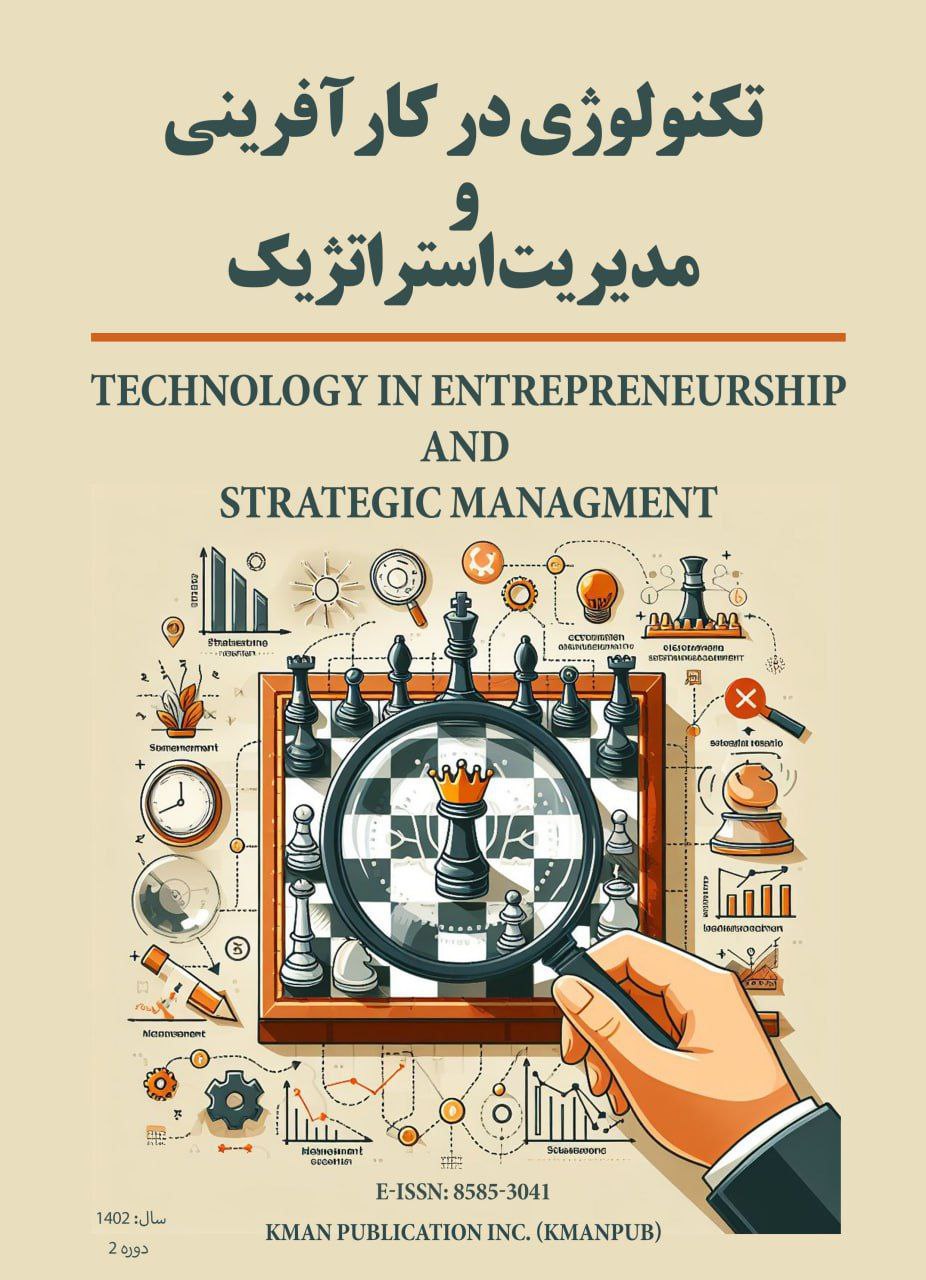شناسایی عوامل مؤثر بر مدیریت فرآیند کسب و کار استارتاپها (مطالعه موردی: خدمات ورزشی)
کلمات کلیدی:
کسب و کار, استارتاپ, خدمات ورزشیچکیده
هدف مطالعه حاضر بررسی و شناسایی عوامل مؤثر بر مدیریت فرآیند کسب و کار استارتاپ خدمات ورزشی در ایران بود. این تحقیق از نوع آمیخته (کیفی و کمی) بود. جامعه آماری بخش کیفی پژوهش شامل کلیه مدیران و متخصصان صاحبنظر و آگاه در ارتباط با موضوع بود که تعداد نمونه آماری با در نظر گرفتن اشباع نظری تعداد 15 نفر بود. در بخش کمی جامعه آماری پژوهش، دانشجویان دکتری و اساتید و نخبگان مدیریت ورزشی، افراد دارای تحصیلات آکادمیک و هم از افراد دارای تجربیات ارشمند در حوزه استارتاپهای ورزشی و مدیران با تجربه و آگاه به موضوع بودند که تعداد نمونهها براساس فرمول برای جامعه نامحدود 384 نفر در نظر گرفته شد. ابزار جمعآوری اطلاعات در بخش کیفی مصاحبه،مصاحبه عمیق و در فاز دوم پرسشنامهای محقق ساخته بود. برای تجزیه و تحلیل دادهها در بخش کیفی از روش نظریه داده بنیاد از طریق کدگذاری باز، کدگذاری محوری و کدگذاری گزینشی انجام شد و در بخش کمی شامل محاسبه اعتبار سازه پرسشنامه و بررسی ساختار تحلیل عاملی اکتشافی آن با استفاده از نرمافزار Spss 20 و Smart PLS3 انجام شد. نتایج پژوهش نشان داد که تغییرپذیری (تغییرات روزافزون بازاریابی استارتاپهای ورزشی، همراهی با تغییرات از طریق طراحی سایتهای اطلاعاتی) با ضریب مسیر 920/0؛ پایداری (حضور فعال در شبکههای اجتماعی مورد علاقه مردم، تلاش برای حفظ و پایداری کسب و کارهای ورزشی در بلندمدت) با ضریب مسیر 951/0؛ تامین منابع (داشتن تیم بازاریابی قوی در کسب و کارها، استخدام نیروهای متخصص در حوزه استارتاپ) با ضریب مسیر 941/0 و مدیریت دانش (افزایش دانش در خصوص خدمات ورزشی در کسب و کارها، گسترش اطلاعات در خصوص استارتاپهای ورزشی) با ضریب مسیر 951/0 از شرایط علی مدیریت فرآیند کسب و کار استارتاپ خدمات ورزشی در ایران بود در مجموع، این نتایج بر اهمیت ایجاد و تقویت عوامل تغییرپذیری، پایداری، تامین منابع و مدیریت دانش در استارتاپهای خدمات ورزشی تأکید میکند. پیشنهاد میشود که مدیران و سیاستگذاران این حوزه بر طراحی و اجرای استراتژیهایی متمرکز شوند که این شرایط را در سازمانهای نوپا تقویت کنند.
دانلودها
مراجع
Berg, V., Birkeland, J., Nguyen-Duc, A., Pappas, I. O., & Jaccheri, L. (2020). Achieving agility and quality in product
development-an empirical study of hardware startups. Journal of Systems and Software, 167(1).
https://doi.org/10.1016/j.jss.2020.110599
Bocken, N., & Snihur, Y. (2020). Lean Startup and the business model: Experimenting for novelty and impact. Long Range
Planning, 53(4). https://doi.org/10.1016/j.lrp.2019.101953
Elyasi, M., Mohammadi, M., Jafari, H., & Karami, P. (2019). A review of the global experiences of startup companies in the
field of sports and physical health. Knowledge-based Technology Publications.
Hattink, B., & Groen, A. (2021). A system innovation related to sports entrepreneurship. In Innovation and Entrepreneurship
in Sport Management. Edward Elgar Publishing. https://doi.org/10.4337/9781783473960.00011
Hattink, B., & Wichers, J. (2021). Sports and entrepreneurship. In World Encyclopedia of Entrepreneurship. Edward Elgar
Publishing. https://doi.org/10.4337/9781839104145.00075
Hayduk, T. (2020). The Future for Sport Entrepreneurship. In Sport Entrepreneurship and Public Policy (pp. 135-152).
https://doi.org/10.1007/978-3-030-29458-8_9
Kwon, S., Liu, X., Porter, A. L., & Youtie, J. (2019). Research addressing emerging technological ideas has greater scientific
impact. Research Policy, 48(9). https://doi.org/10.1016/j.respol.2019.103834
Satar, M. S., & John, S. (2016). A conceptual model of critical success factors for Indian social enterprises. World Journal of
Entrepreneurship, Management and Sustainable Development, 12(2), 113-138. https://doi.org/10.1108/WJEMSD-09-
-0042
Silva, E., Beirão, G., & Torres, A. I. (2023). How Startups and Entrepreneurs Survived in Times of Pandemic Crisis:
Implications and Challenges for Managing Uncertainty. Journal of Small Business Strategy.
https://doi.org/10.53703/001c.72084
Souza, C. M. (2019). A framework for identification, selection and collaboration of Corporations with Start-ups within Open
Innovation https://repositorio-aberto.up.pt/bitstream/10216/121642/2/344594.pdf
Stefanovic, I., Prokic, S., & Rankovic, L. (2010). Motivational and success factors of entrepreneurs: the evidence from a
developing country. Original scientific paper, 28, 251-269.
nce_from_a_Developing_Country
Terra, N., Rodrigues, J. C., & Maia, C. (2019). Business model evolution in university startups of the healthcare sector. 2019
IEEE International Conference on Engineering, Technology and Innovation (ICE/ITMC),
Yearworth, M. (2010). Inductive Modelling of an Entrepreneurial System. 28th International System Dynamics Conference,
Zhuge, K. (2023). Can Adopting Lean Startup Strategy Promote the Sustainable Development of New Ventures? The Mediating
Role of Organizational Iterative Learning. PLoS One, 18(8), e0290849. https://doi.org/10.1371/journal.pone.0290849
Zimmerman, M. A., & Chu, H. M. (2013). Motivation, Success, and Problems of Entrepreneurs in Venezuela. Journal of
Management Policy and Practice, 14(2), 76.
https://www.proquest.com/docview/1429361694?sourcetype=Scholarly%20Journals
دانلود
چاپ شده
ارسال
بازنگری
پذیرش
شماره
نوع مقاله
مجوز
حق نشر -1 تکنولوژی در کارآفرینی و مدیریت استراتژیک

این پروژه تحت مجوز بین المللی Creative Commons Attribution-NonCommercial 4.0 می باشد.











